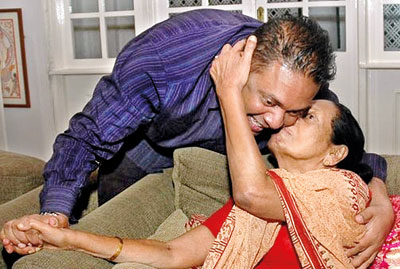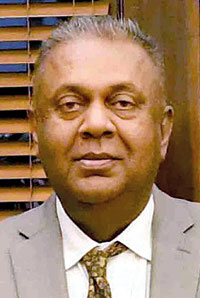Columns
His liberal creed ruled supreme, and outsoared mundane politics
View(s):- AFTER COVID TRAUMA, HEART ATTACK CLAIMS OUTSPOKEN STATESMAN’S LIFE
- Nation grieves death of Mangala Samaraweera at the age of 65
Not only did this inherent pervasive sensitivity of soul make him repel the mire of racism which remained for him untrodden virgin lair but it also led him with passion to rebel against the mutated beliefs of his times and see Lankans freed of its binding shackles.

MOTHER’S HUG FOR ‘KHEMAGE KOLUWA’: Mangala receives a warm embrace and blessings from his mother, Khema, who doted on him and was doted in return by him
He lived his life as he had designed it. Moulded his beliefs into shape and form as he willed it. Played his role as he visioned it: and when the ordained script struck a discordant note with his staunch principles, took his curtain call and bowed out from stage to pursue the good fight from the wings.
Perhaps, it was from his father’s liberal outlook and conduct that Mangala inherited and imbibed his own liberal philosophy. A proctor by profession, his father Don Morten Samaraweera — who later changed it to Mahanama by deed poll to keep with the times — had entered politics in 1943 by winning a seat at the Matara Urban Council. In 1952, he entered Parliament on the Communist Party ticket but had climbed aboard the S.W.R.D. Bandaranaike bandwagon thereafter.
When SWRD became Prime Minister in 1956, he was appointed as the Parliamentary Secretary to the Minister of Justice. It was during this time that the death penalty was suspended by statute for a trial three-year period, but quickly restored when Bandaranaike was assassinated in 1959. On July 23, 1960, he was appointed Minister of Local Government by Mrs. Bandaranaike, and 1963, as the Minister of Communications as well.
But when the Government introduced the Press Council Bill and sought to nationalise the Lake House group of newspapers the following year, Mahanama Samaraweera struck a blow for press freedom by walking out with 12 other members, thus precipitating a general election. He soon joined the Sri Lanka Freedom Socialist Party and contested the 1965 general elections as a coalition partner of the UNP but lost his Matara seat. In 1966, he met his untimely death at the age of 49, when Mangala was only 11.
 Mahanama Samaraweera had briefly sojourned in the Communist Party, settled down in the SLFP but had packed his bags and hit the road when the wind turned nasty and threatened to uproot his sturdy liberal oak, visiting the UNP household to camp outside for respite. But he had trail blazed the liberal path, his son, Mangala, would follow in the years to come.
Mahanama Samaraweera had briefly sojourned in the Communist Party, settled down in the SLFP but had packed his bags and hit the road when the wind turned nasty and threatened to uproot his sturdy liberal oak, visiting the UNP household to camp outside for respite. But he had trail blazed the liberal path, his son, Mangala, would follow in the years to come.
Mahanama’s sudden death caused an upheaval in the Samaraweera household and the mantle of raising Mangala and his elder brother and sister fell squarely upon his mother, Khema. She rose to the task admirably and, amidst adverse circumstances, did a splendid job single parenting her three children. The special bond which developed between her and her youngest child, Mangala, lasted until her demise in 2008; and she doted on him and in return was doted on by Mangala who, in fond remembrance, referred to himself in later years as ‘Khemage Koluwa’.
Though born to the Sinhala Buddhist legacy in the heartland of the Sinhala southern stronghold of Matara, this son of Ruhuna did not remain its prisoner but forsook his priestcraft riddled ancestral faith to embrace instead the teachings of Gautama the Buddha who expounded that not race, caste or creed shall make supreme whom birth has made equal.

MANGALA: Social reformer
After his advent into politics in 1983 when he was appointed by Mrs. Bandaranaike as the SLFP Matara organiser, he took up the cause of youth irrespective of their political creed. In the dark days of the late eighties when southern tyre fires became roadside pyres for hundreds of slain youth, and the country was engulfed in a pall of smoke, he became the co-convener of the ‘Mothers’ Front’ movement, and along with his then party colleague, Mahinda Rajapaksa, raised his voice against human rights violations, campaigning for women whose sons or husbands had been killed in the Government crackdown against JVP rebel forces.
But while others looked askance at human rights abuses when saddled in power, even using it to tighten their grip on the reins to further their reign, Mangala’s deep commitment to the inalienable rights of man which ennobled humanity remained resolute. Holding them as inviolate, he held it as his guiding star by which light all else were measured; and whenever its shining light revealed sights of these hallowed rights desecrated, his sensitive soul recoiled in horror but rendered his rebellious spirit to revolt against the injustice though the heavens should fall on his political career.
Indeed, defending human rights at the risk of his own political fortunes had been the hallmark trait than had distinguished Mangala Samaraweera from the rest. In January 2007, just a year and two months after being widely credited as the architect of Mahinda Rajapaksa’s presidential poll victory, Mangala was removed as the Minister of Foreign Affairs in a cabinet reshuffle. Two weeks later, he was summarily dismissed from his remaining portfolio of Ports Minister.
But, though out of office and bereft of power, Mangala continued to battle the windmills alone, his solitary voice championing the minorities’ cause from his exiled wilderness. In the aftermath of the ethnic war, he was one of the first to reach out to the marginalised Tamil minority. When the chauvinistic torch turned starkly on the Muslims as the new ogre to be flogged, he was in the forefront to condemn it.
When the big guns boomed Sinhala Buddhist supremacy and a synthetic, saccharined phony patriotism was hyped as true love for the motherland, with a nonexistent Lankan lion parading, sword in hand, as its roaring mascot in a bizarre, though successful, attempt to rally the masses behind its promotors, Mangala Samaraweera, with his own southern Sinhala Buddhist pedigree, could have stepped in to amplify the call and make capital out of it to promote his own political career by leaps and bounds.
But he did not. Not for him to stoop to such base levels to marshal the popular vote. Instead he committed political suicide by raging against the swelling tide of his Sinhala Buddhist electorate, and was soon reduced to a political pariah by the new shallow bread of pseudo-patriots, the new seedy political culture had spawned for political gain.
But he refused to compromise the integrity of his principles. His vision for a truly united Lanka never deserted him but remained indelibly etched. In one of his last speeches as the Minister of Finance, he told Parliament during the Constitutional Reform debate on July 26, 2019 that prosperity will be ever elusive unless this nation is able to transcend racial divides.
He said: “We will never enjoy peace and prosperity until all the communities and citizens of this country feel in their hearts that they are full Sri Lankans, not de facto second class citizens whose existence depend upon the magnanimity of the majority community.”
Mangala was never cut out to be the caricature of a politician but ever the designer artist he was born and moulded to be, having graduated with a Bachelor of Arts degree from London’s prestigious St. Martin’s School of Art. Throughout his life, it seems, he was struggling to get out from the political straightjacket he had donned himself and emerge free to live the bohemian life of the free thinker, a social reformer rebelling against Victorian norms.
He lit a candle for all minority rights, including that of his own minority grouping, coming out of the closet and openly revealing he was a homosexual and advocating gay rights. Oscar Wilde’s love that ‘dared not speak its name,’ in the 19th century was not only openly spoken of but universally practised hundred years later; and, though still taboo in Lanka, he saw no reason to drape himself in pristine puritan white and hide his sexuality from public gaze but lay bare both body and soul.
He was also one of the few public figures to read his own obituary. Last week, having learnt of his COVID affliction, the social media was awash with news of his premature death. Aghast at the thought, people were grieving in print this Monday, what a loss that would have meant for Lanka.
But sadly, Mangala Pinsiri Samaraweera didn’t make it through the night. In the twilight hours ere Tuesday’s dawn, his weakened heart gave up the ghost after a ten-day COVID ordeal.
Farewell, sweet Prince, may a host of liberated angels sing thee to thy Nirvana bliss.


Leave a Reply
Post Comment